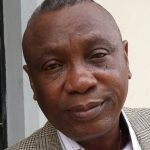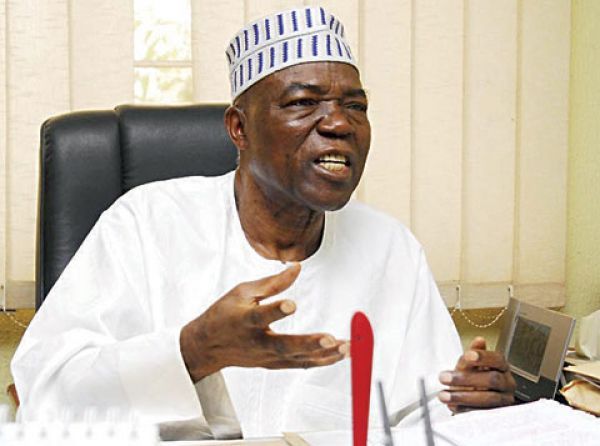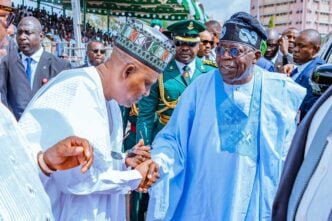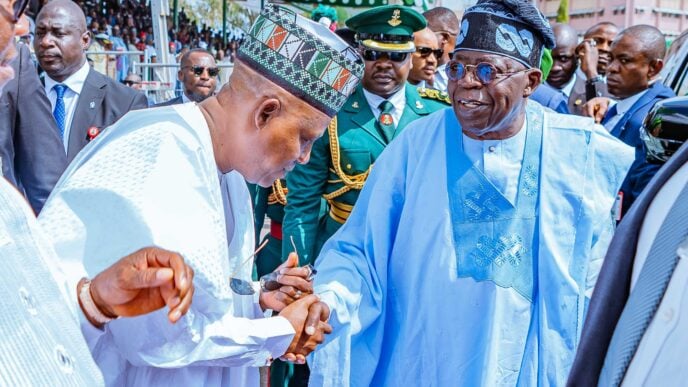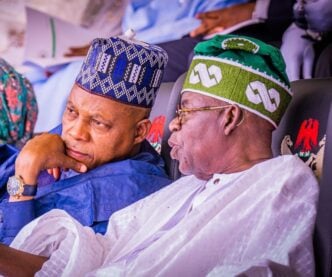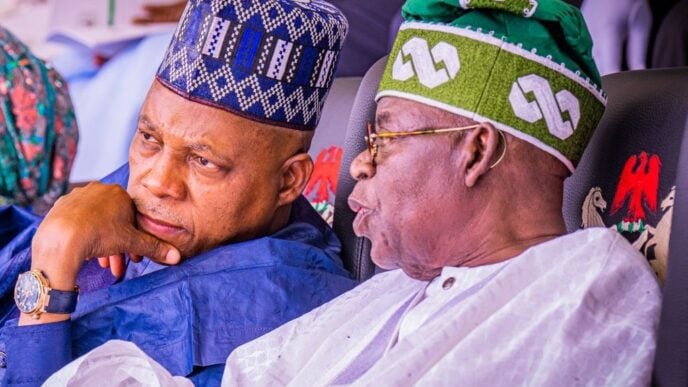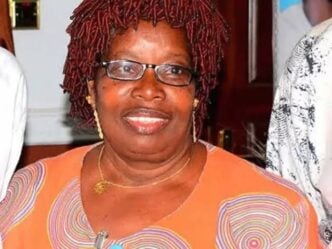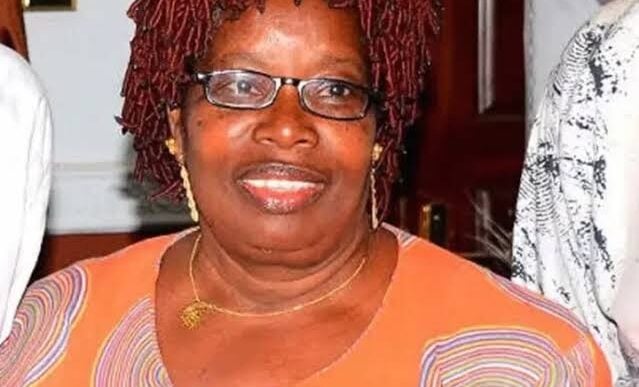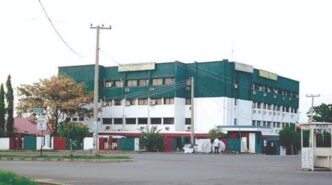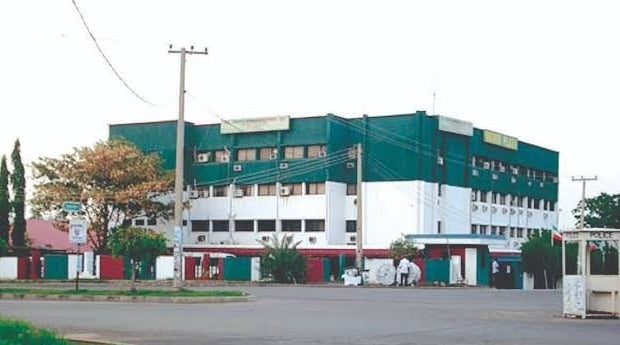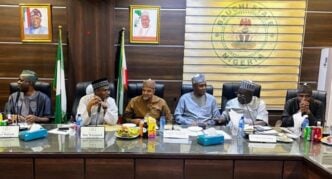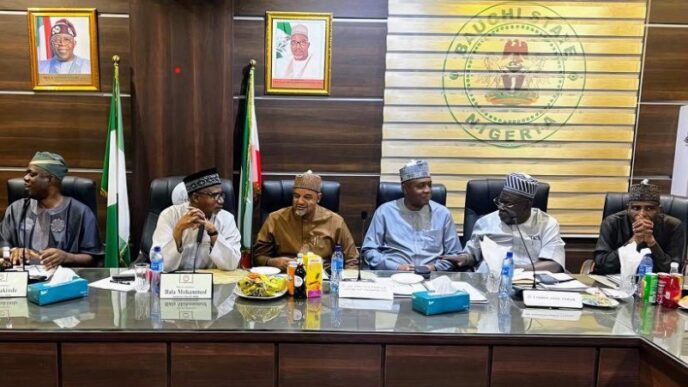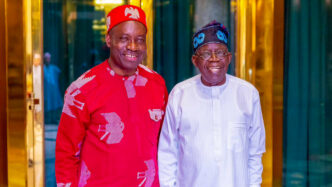Jeremiah Useni
General (rtd.) Jeremaih Timbut Useni (16 February 1943-23 January 2025) alias JERRY BOY, who answered the final call in Paris, France, was partly a fulfilled man.
The then Head of State, Major General(rtd.) Muhammadu Buhari (82) GCFR appointed him as the Governor of Bendel State (now Edo and Delta States) in January 1984. He was there between January 1984 – August 1985. On September 12, 1985, General Ibrahim Babangida (83) GCFR appointed him Minster of Transport and Aviation while General Sani Abacha appointed him Minister of the Federal Capital Territory (FCT) between 1993 and 1998. He narrowly missed being Head of State after General Sani Abacha GCFR (20 September 1943 – 8 June 1998) died on the night of June 7, 1998.
That is twenty-seven years ago, this month.
If General (rtd.) Jeremiah Useni had become the Head of State on June 8, the course of history would have changed. He is alleged to have been among the last persons along with Group Captain Emeka Omeruah (14 August 1943 – 4 December 2006) and who served as governor of Anambra State from 1985 to 1987 and as Minister for Information, Youth, Sport and Culture, to see General Sani Abacha, before he drove to the Guest House in THE VILLA where he died. Group Captain Omeruah (rtd.) was in THE VILLA that night for the financial approval of the budget for the 16th FIFA world cup edition held in France from June 10 to July 12, 1998.
Advertisement
Till today, General Sani Abacha’s passage is still full of mystery.
All that is known is that the Palestine Liberation Organisation, Leader, Yasser Arafat (August 1929- 11 November 2004), flew to Abuja on Sunday, June 7 and he invited General Sani Abacha to a meeting of the Organisation of African Unity (OAU) to hold in Ouagadougou, Burkina Fasso on Monday, June 8. The meeting was to decide on the internal crisis that rocked the OAU. In addition, President Blaise Compaore (74) of Burkina Fasso, was to take over the leadership of OAU from President Robert Mugabe of Zimbabwe on Monday June 8.
General Sani Abacha GCFR (20 September 1943 – 8 June 1998) declined to attend the meeting and instead, he instructed the Secretary to the Government of the Federation, Alhaji Gidado Idris GCON (15 March 1935 – 15 December 2017), who was also the Head of THE CABINET Secretariat to summon a meeting of the Provisional Ruling Council (PRC) for that week.
Advertisement
Part of the schedule of the Secretary to the Government of the Federation at that time was also to serve as the Secretary to the National Council of States, Secretary to the Federal Executive Council, Secretary of the Provisional Ruling Council, Secretary of the Security Council and head of the staff of the then State House. THE VILLA at that time had no Permanent Secretary or Chief of Staff. It was under the office of the Principal Secretary to the head of State.
The Provisional Ruling Council (PRC) was summoned to decide on the report of General Victor Samuel Leonard Malu (rtd.) (15 January 1947 – 9 October 2017), who was then the Commander of the Lagos Garrison.
At that time, the following were members of the Provisional Ruling Council, General Abdusalam Abubakar GCFR, who was the Chief of Defence Staff and Rear Admiral Mike Okhai Akhigbe GCON, who was the chief of Naval Staff. Others were Air Vice-Marshal Adamu Musa Daggash (Commandant, Nigerian Defence Academy, Kaduna), Chief of Army Staff – Maj. Gen. Ishaya Bamaiyi, Chief of Air Staff – Air Vice Marshall Nsikak Eduok, Rear Admiral Jubril Ayinla,
Inspector General of Police Ibrahim Coomassie, Lt. Gen. Jeremiah Useni (Minister of the Federal Capital Territory) Commandant, Command and Staff College and Maj. Gen. John Inienger, Commandant, National War College, Abuja.
Advertisement
Others were Maj. Gen. Chris Abutu Garuba, Commandant, Nigeria Defence Academy Kaduna – Brigadier Gen. Bashir Magashi, Maj. Gen. Abdullahi Muktar – General Officer Commanding 1st Division at Kaduna, GOC 2nd Division (Ibadan) – Brig. Gen. Felix Mujakperuo, GOC 3rd Division (Jos) – Brig. Gen. Peter Shaa, GOC 82nd Division (Enugu) – Maj. Gen. Oladayo Popoola, Commander, Lagos Garrison – Maj. Gen. Victor Malu, Flag Officer commanding Western Naval Command – Rear Admiral Rufus Eyitayo, Flag Officer commanding Eastern Naval Command – Commodore Victor Ombu, Tactical Command (Benue) – Air Commodore Emmanuel Edem Training Command, Lagos Commander of Ecomog Forces – Air Vice Marshal G.Y. Kontagora, Representing Defence Headquarters, Lagos – Maj. Gen. Timothy Shelpidi Representing Defence HQ, Lagos – Air Commodore Ibrahim Musa, Representing Defence HQ, Lagos – Brig. Gen. Muftau Balogun, Representing Defence HQ, Lagos – Commodore Taiwo Odedina, Representing Defence HQ, Lagos – Naval Captain Anthony Oguguo, Representing Defence HQ, Lagos – Air Commodore Cannis Uwenwaliri, Brig. Gen. Patrick Aziza (Minister of Communications) and Lt. Gen. Mohammed B. Haladu.
On Tuesday, April 28, 1998, General Malu’s Tribunal sentenced General Diya and others to death. Those sentenced to death were Lieutenant-General Oladipo Diya, former Vice Chairman, Provisional Ruling Council, and Chief of General Staff; Major General Abdulkareem Adisa, former Minister of Works and Housing; Major General Tajudeen Olanrewaju, former Minister of Communications; Major Seun Fadipe, Chief Security Officer to Diya; Colonel Olu Akiode, former Military Assistant to General Olanrewaju and a civil engineer, Bola Adebanjo, an associate of Diya.
Four of the accused persons were convicted of “information gathering” and implication in the alleged coup plot, and sentenced to life imprisonment. They were Colonel Edwin Jando, Mr. Isaiah Adebowale, Mr. Niran Malaolu (Editor of Diet Newspaper) and Mrs. Shola Soile.
Two of the accused persons were convicted of theft and sentenced to 14 years’ imprisonment: Lieutenant-Colonel I.E. Yakasai and Major Biliaminu Mohammed. Colonel Yakubu Bako was convicted for illegal importation of fire arms and was sentenced to 10 years imprisonment.
Advertisement
Three were convicted of theft and handling of stolen goods. They were sentenced to various prison terms: Ojeniyi Adeola (two years), Michael Maidamino (five years) and Galadima Tanko (two years). The Tribunal acquitted 14 persons on unspecified charges: Major Yusuf Isiaku, Navy Captain B.A. Shoetan, Warrant Officer Coker Oladosu, Staff Sergeant Moses Eni, Corporal I. Kontagora, Corporal Eddy Egbunu, Bawa Machido, Omatimehin Abimbola, Halima Bawa (female who was never shackled), Eliyasu Mohammed, Professor Femi Odekunle, Chief Yomi Tokoya, Mr. Musa Adede (a businessman) and Ibrahim Moussa Orgar. Released uncharged on 20th April 1998: Colonel Daniel Akintonde, former Military Governor of Ogun State and Colonel Emmanuel Shoda.
In sentencing the officers, General Victor Malu said there was overwhelming evidence proving Diya had amassed a small army of loyal troops by the time his plot to overthrow the regime was discovered. Malu, dismissed Diya’s claims of innocence. “The findings of the Tribunal were that he presided over and actively participated in several meetings in which the coup was discussed.” Malu said.
Advertisement
Those sentenced pleaded not guilty and insisted that the General Malu’s report was biased.
All of them have since been pardoned by President Muhammadu Buhari GCFR (82) and their pardon has been published in the Federal Government Gazette including General Diya and Major General (rtd.) Tajudeen Olanrewaju alias Jasper.
When General Sani Abacha GCFR (20 September 1943 – 8 June 1998) summoned for the PRC meeting, it was to decide on the General Malu’s report, either to confirm or to reject the report. If the PRC had confirmed the report, the officers found guilty would have been executed that week. Fate intervened on the issue.
Advertisement
On Monday morning the members of the PRC that met on that Monday June 8 were simply told that General Abacha had died the previous night. There was confusion all around THE VILLA that Monday. Most civilians working in THE VILLA were not allowed to enter THE VLLA including members of THE CABINET secretariat who were to take the minutes of the PRC meeting. Alhaji Gidado Idris had to intervene with the soldiers to allow his personal staff including me to be allowed in.
Hostile soldiers were at the gates leading to THE VILLA.
Advertisement
When the PRC finally met in the morning it was very brief. There were two meetings of the PRC that day—one in the morning, the other in the night. The morning meeting was interrupted by the Inspector General of Police, Ibrahim Coomassie (18 March 1942 – 19 July 2018) and General Bashir Salihi Maggashi (75) who both pleaded that General Sani Abacha should be allowed to be buried in Kano before the issue of successor be decided.
The members of the PRC then agreed to honour General Abacha GCFR by burying him in Kano before coming back to THE VILLA to select his successor.
From that moment the intense lobby to succeed General Sani Abacha began. Those in the know of things were never tired to conclude that if the first meeting of the PRC had been concluded, General Useni would have been, maybe the Head of State.
At that time there were three Lieutenant Generals in the Nigerian Army. They were Lieutenant General Donaldson Oladipo Oyeyinka Diya (rtd.) GCON (3 April 1944 – 26 March 2023), who was in chains, Lieutenant General Mohammed Balarabe Haladu and Lieutenant General Useni. General Haladu (1944 – 28 June 1998) was indisposed at that time and unfortunately, he died 20 days after General Abacha’s death.
After serving as Commandant of the Nigeria Defence Academy, General Haladu’s last posting was to the Ministry of Industry. A brilliant officer from Kano. General Haladu had his military training in Nigeria Military School, Zaria, Pakistan Military Academy and University College of Wales.
If we are to go by seniority, one of the Lieutenant Generals should have been selected as Head of State.
Some will argue that at the time of General Abacha’s death, General Useni was holding a political appointment as FCT Minister. That appointment made it ineligible for him to be voted for, by the members of the Provisional Ruling Council as Head of State.
When I saw Major General (rtd.) Muftau Balogun who was a member of the Provisional Ruling Council at that time, last week at Ikoyi Club, he said he has put June 8, 1998 behind him and has allowed bygones to be bygones, “Eric don’t forget this happened twenty-seven years ago”.
He has moved on, for in 2017, he was elected Chairman of Ikoyi Club.
The PRC meeting that was to decide on the fate of General Diya instead selected General Abdusalam Abubakar as the Head of State after burying General Abacha in Kano. Till today the Malu report was never approved or rejected. It was never considered.
If we are to believe the report of what happened that day, the then Chief of Army Staff, Lt-General Ishaya Bamaiya wrote in his book titled, “THE VINDICATION OF A GENERAL”, “General Abacha died in the early hours of 8 June 1998. His family decided he would not be given a military burial and had to be buried at night in Kano. Before leaving Abuja for Kano with the remains of General Abacha, I observed that some officers were not ready to go to Kano for the burial.
At the Airport, I had to order Marwa to go into the aircraft to proceed to Kano. At that time, I had already given orders to Lt Colonel Mana Co81Bn Keffi to ensure no officer took any step against the government; he was not to take orders from anyone but me. He was ordered to deal with anyone who made any move to take over the government while we were in Kano.
We returned from Kano and went into the Chambers to decide who would become the Commander in Chief. While in Kano, some senior officers had decided the Chief of Army Staff would take over the government. I had never been interested in any political office, had avoided so far, and had no intention of taking up the position of Commander in Chief. I made this clear to the to the senior officers who insisted I should take over, including Generals Victor Samuel Leonard Malu, Bashir Salihi Magashi and Patrick Aziza. I was also aware of some junior officers who were against my taking over as Commander in Chief because they knew I would not tolerate them in service.
The problem I had convincing the senior officers to allow General A.A. Abubakar to take over.
The issue of succession now fell to me, and some of the commanding officers and the staff told me I had to take charge to save the situation. I told them I believed in Abubakar, and we should support him.
While this was going on, some junior officers were campaigning against Useni and me. They believed that once I took over, they would be in trouble, but I never had any intention of taking any political post. I had joined the army not for politics.
When I told the senior officers I would not take over as Commander in Chief, the officers close to me said I was going to regret this action. I did not believe them because General Abubakar and I had been very close since we had been Lieutenant and played hockey for 2 Mechanised Division with Generals Shehu Yar’Adua and Jeremiah Useni.
As soon as we got into the chambers, Abubakar started distributing papers as if there were going to be election. Meanwhile, people were there with Bibles and Qurans because they did not know who the Commander in Chief was going to be.
It took a lot of persuasion to get the officers to accept General Abubakar. This was why during the swearing in of the Commander in Chief, the Quran and the Bible were brought into the chamber’s unknown to many officers and the PRC members. After the discussion, no decision was reached because papers were passed around for officers to nominate a Commander in Chief. I knew that problem could arise from there. When it was my turn, I got up and announced we had all agreed that General Abubakar was to be the Commander in Chief and had been promoted to a four-star general. Abubakar was sitting next to me. That was how we succeeded in making General Abubakar the Commander in Chief.
I am glad that in the minutes of the PRC emergency meeting of 8 June 1998 at the Council Chambers, Asokoro, Abuja, Mr. T. Fagbemi, who took the minutes, stated, ‘a member supported succession by hierarchy, then he announced the Chief of Defence Staff, Major General A.A. Abubakar as the HOS, Cin C. The member suggested further that he should be promoted to the rank of a four-star General. This member was General IR Bamaiyi (COAS).’ Questions were asked about why Lt. General J.T. Useni, the most senior officer when General Abacha died, was not made Commander in Chief. Many put the blame on some of us at that time. It was difficult to sell Useni for a number of reasons.
First and foremost, General Useni was the last officer to be with the late General Abacha when he died, and there were many insinuations of his involvement in Abacha’s death. These were mere insinuations; I believe General Useni had no hand in General Abacha’s death. I became more convinced when, at the Oputa panel, a document recovered from a security officer’s house in the officer’s handwriting stated clearly, ‘We killed Abacha.’ This document was handed over to the Oputa panel but was only mentioned in a corner of the Oputa panel report. Since it was about General Abacha, the government did not care to investigate the matter, nor did the panel make any recommendation about it. I strongly believe if this document had been investigated, the truth of General Abacha’s death would have been known.
The second reason was that when politicians and some junior military officers were planning to make Abacha succeed himself, General Useni was said to have been too involved in the succession plan. Although General Abacha did not show that he knew and approved of it, I believe he was aware and did not oppose it. We could not have supported General J.T. Useni to succeeded Abacha because of national interest and consideration of the Abacha family.
As previously mentioned, my relationship with General Abubakar dates back to the immediate post-civil war era when with a number of officers including Lt SVL Malu and Major J.T. Useniwe played hockey together in Benin City. Against this backdrop, supporting General Abubakar was the natural thing to do.
Unfortunately, as soon as he became the Commander in Chief, he changed. One day, I went to see him while he was still in Fort IBB. He told me he hoped the job God has given him would not stain our relationship. I was shocked by that statement but did not take it seriously. I told him he was the Commander in Chief and our relationship depended on him. He emphasized that he had been assured of my absolute loyalty during his nomination. I added that if at any time he felt threatened by me, I was ready to resign and go home. I thought the matter ended there.
He started holding meetings with Generals Babangida and Aliyu Gusau. I was receiving reports of their getting together. I did not bother myself about such meetings because I knew we were not staying long in government. Unknown to me, General Abubakar had already committed himself to Generals Babangida, TY Danjuma and Aliyu Gusau on General Obasanjo’s coming to take over from him—a proposal I totally objected to, which I told Generals Abubakar, TY Danjuma and Aliyu Gusau in very clear terms.
My stand did not go down well with the Generals, and General Abubakar started feeling unsafe. He started using some officers, especially from intelligence, to write all sorts of reports against me saying I was too ambitious and wanted to be the Commander in Chief. I expected General Abubakar to know that I had no ambition of becoming the Commander in Chief since no one would have stopped me from taking over after General Abacha’s death. One may ask why he did not simply remove me. This could have been because he knew I had total control of the ARMY, and any move to remove would have removed him as well; even though he did not trust me, he knew he could not do without me.
Then came the appointments to determine who his CGS would be. He asked for my suggestions. Out of loyalty and respect for seniority, I mentioned the two most senior officers then in serviced, Major General Rufus Kupolati and AVM Ayinla, who was a minister. Abubakar told me that Kupolati from Kogi was from the north, just like him. This was true, but I thought Ayinla, as the most senior officer, was most qualified. He told me he would think about it. The next day, he told me he had decided to make Chief of Naval Staff (CNS) Akhigbe the CGS and make AVM Ayinla the CNS. He said he would make the CDS and the Minister of Defence Staff. I did not comment on this.
After some days, he sent for me again and said he would keep me in the Army as COAS. I believe he had discussions with some friends and was advised to hold the Ministry of Defence. He asked for a suggestion for a CDS, which should be outside the Army. I knew AVM Daggash was also a close friend of Abubakar and suggested him. General Abubakar immediately agreed.
We went to ministerial appointments in which some ministers were brought back while others were dropped. We agreed that General PN Aziza was to be the minister of transport, and Abubakar had me inform Aziza. Surprisingly, when the ministerial appointments were released, General Aziza was not the minister of transport. I now realized that a man’s character is only known when he has power and money.
It is important to note that as COAS during Abubakar’s time, I never received anything for the Nigerian Army. For every project I planned, I always kept funds and was able to complete all of them. I left a cash and bank balance of about two billion naira for General Malu, who succeeded me. I am glad General Malu openly said this because he was also starved of funds by the Obasanjo administration. The funds I left for him enabled him to run the army.
It is evident that Abubakar was being misled from outside the government about me. This led to his taking me along when he visited the United Kingdom, the US, and France for fear of being overthrown by me- a fear his advisers put into him”.
That was the account of General Ishaya Bamaiyi.
But those of us at THE VILLA in the early morning of June 8, knew that apart from Mr. T. Fagbemi, who General Bamaiyi claimed wrote the minutes of the meeting, no other civilian was present at the meeting. Mr. Bisi Ogunniyi, a hardcore bureaucrat from Iree in Osun state, who served the longest in THE VILLA, told me recently, that the atmosphere at THE VILLA, on that day was “fully charged”.
Admiral(rtd.) Taiwo Odedina from Ijebu Ode, who was a member of the Provisional Ruling Council then, and now a golf enthusiast told me at Ikoyi club, that till today, he was still trying to comprehend what fully happened.
Suffice it to say that the Chief Justice of the Federation at that time, Justice Mohammed Lawan Uwais (88), was at the residence of General Abacha along with Alhaji Baba Gana Kingigbe GCON now 80 (then Minister of Power and Steel), Alhaji Gidado Idris and the Inspector General of Police, Ibrahim Coomassie (18 March 1942 – 19 July 2018) in the morning of June 8. They were among the first set of people to be told of the former head of states’ death. They offered prayers before the corpse was taken to Kano for burial.
The Chief of Defence then, Major General (rtd.) Abdusalam Abubakar (82) GCFR was at the residence too and strangely enough came in a jogging track suit and left after the prayers only to come back in full military attire to accompany the corpse to Kano.
June 8 was a historic day, a sort of historic watershed in this country especially in THE VILLA. The atmosphere that day was subdued. It was depressing and sober. People were watching instead of talking as there was nothing to talk about. Those working in THE VILLA wore gloomy faces.
What happened that June 8, 1998, cannot be fully captured or defined by anyone not even by Major (rtd.) Al Hamza Al Mustapha (65) from Nguru in Yobe State, the Chief Security Officer to General Sani Abacha, who lost his enormous power and influence that day.
The most powerful instantly became tamed and submissive. There was suspense in the air. No one was sure of what was to happen.
No one could give any command in THE VILLA that day.
General Sani Abacha’s Chief Physician, Dr. S.S. Wali aged suddenly. Same with his private Secretary, Usman Jiddah Shuwa.
General Abacha’s chief Press Secretary, Chief David Attah and his staff, Musa Aduwak, J.O Abuah, S.M. Katsina, C.C. Okere, S.A. Esa and S.A. Fasheun were all helpless that day.
Chief David Attah has since passed on to glory. An accomplished officer and complete gentle man. I knew him when he was the General Manager of THE NIGERIAN STANDARD in Jos in the seventies, but our friendship grew when he represented Ikpokwu East Constituency in the House of Representatives between 1979 and 1983.
General Useni was not told of General Abacha’s death until he got to THE VILLA that morning of June 8, 1998 and later lost control of himself. He never fully recovered. That night he lost the chance of becoming the head of State of this great country.
At the end of June 1998, General Useni retired from the Army and was pulled out in the traditional Army way after 41 years in service.
He was succeeded as the FCT Minister by Major General (rtd.) Mamman Kontagora (April 20, 1944- May 29, 2013) on August 22, 1998.
Finally, the remains of the former Federal Capital Territory (FCT) Minister, the late Lt. General Jeremiah Timbut Useni, was laid to rest in his family’s burial ground in Telam Village, Pilgani Road Langtang, Plateau State on Saturday, February 22, 2025.
General Useni was buried beside his beloved wife, Mrs Julie Useni, and their son, Danjuma Nancwat Useni, who both tragically died in an EAS plane crash in May 2002.
I hope his soul is resting in peace in Langtang along with the souls of General Domkat Yah Bali (Rtd.) (27 February 1940 – 4 December 2020), Lt Gen Joshua Dogonyaro (Rtd.) (12 September 1940 – 14 May 2021), Brigadier John Nanzip Shagaya (Rtd.) (2 September 1942 – 11 February 2018), Major General Joe Garba (Rtd.) (17 July 1943 – 1 June 2002), Chief Solomon Daushep Lar (17 July 1943 – 1 June 2002) and other Langtang heroes.
General Useni was a product of military intrigue and no wonder he became a victim of military intrigue too. And like all of us, we are all victims of military intrigue too for daily we endure the military LEGACY.
Views expressed by contributors are strictly personal and not of TheCable.
